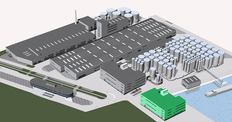- Simadan Holding announced a €65 million investment in a new biodiesel plant in Amsterdam on 9 January 2014.
- The plant will increase biodiesel production capacity by 150,000 tonnes annually.
- The investment includes a glycerine distillation factory to produce 50,000 tonnes of pharmaceutical grade bioglycerine per year.
- A quay and jetty will be built under the supervision of Port of Amsterdam for raw material supply and biodiesel transport.

Investment Announcement
On 9 January 2014, Simadan Holding announced a €65 million investment in a new, second-generation biodiesel plant in Amsterdam. This investment aims to expand capacity in the biofuels market, specifically from waste products.
Production Capacity
The new plant, operated by Simadan subsidiary Biodiesel Amsterdam, will increase biodiesel production capacity by 150,000 tonnes annually. Additionally, the investment includes a glycerine distillation factory to produce 50,000 tonnes of pharmaceutical grade bioglycerine per year.
Ecological Industrial Complex
The plant will be part of Europe's largest ecological industrial complex, which spans 12 hectares and includes a biodiesel plant, tank storage terminal, recycling factory, biogas factory, and tank cleaning company. The complex converts over 99% of incoming organic waste into sustainable biodiesel, green energy, and new bio raw materials.
Relocation of Rotie
Simadan subsidiary Rotie has moved to this new location in the port of Amsterdam. The new recycling factory is equipped with advanced techniques to enhance efficiency and sustainability. Rotie collects used cooking oils and organic waste from restaurants and the food industry, converting them into biodiesel, biogas, and green energy.
Port of Amsterdam Involvement
For the supply of raw materials and the transport of biodiesel, a quay and jetty will be constructed under the supervision of Port of Amsterdam. The port aims to support sustainable and innovative growth while maintaining environmental quality through collaboration with business partners and regional authorities.

